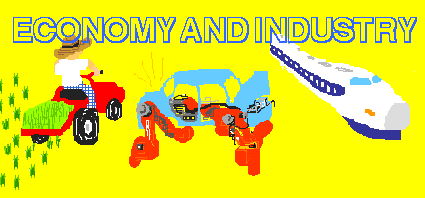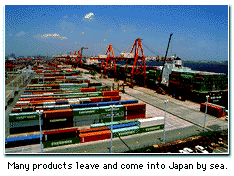 |
 Economically, Japan is one of the most highly developed nations in the world. Its gross national product (the value of all the goods and services a nation produces) is the second biggest in the world. Japan is especially strong in manufacturing; many cars and household appliances are produced and exported all over the world, and brand names like Sony, Toyota, and Honda have become quite well known. Economically, Japan is one of the most highly developed nations in the world. Its gross national product (the value of all the goods and services a nation produces) is the second biggest in the world. Japan is especially strong in manufacturing; many cars and household appliances are produced and exported all over the world, and brand names like Sony, Toyota, and Honda have become quite well known.
|
| Japan is poor in natural resources, though. Until now, Japanese companies have concentrated on importing raw materials, such as iron ore from Australia and crude oil from the Middle East, and then processed these raw materials to make finished products, which were then exported. But recently, Japan has been importing more and more manufactured products. |
 Japanese companies have also been making "direct investments," mainly in North America, Southeast Asia, and Europe, setting up manufacturing plants to build products that are either sold locally or exported. Through these activities, Japanese businesses are helping the development of industry and creation of jobs in the countries in which they are investing. Japanese-affiliated companies in the United States now account for 9% of the total value of America's exports, for example, and employ about 638,000 Americans. Japanese companies have also been making "direct investments," mainly in North America, Southeast Asia, and Europe, setting up manufacturing plants to build products that are either sold locally or exported. Through these activities, Japanese businesses are helping the development of industry and creation of jobs in the countries in which they are investing. Japanese-affiliated companies in the United States now account for 9% of the total value of America's exports, for example, and employ about 638,000 Americans.
Japan has a well-developed network of roads and railways, with expressways stretching from one end of the country to another and the high-speed Shinkansen, or "bullet train," running from Morioka in the north to Fukuoka in the south. In large cities, there are well-developed public transportation systems such as buses, trains and subways. Commuters use these systems more than cars. Japan's main agricultural product is rice. Since Japan's arable land area is so small, it cannot grow enough wheat, soybeans, or other major crops to feed itself. Japan has one of the lowest rates of food self-sufficiency of all industrialized countries; it must import a high percentage of its food from abroad. Japan's fishing industry is very active, though, as fish is an important part of the Japanese diet. The nation is fourth in the world, following China, Peru and Chile, in its yearly catch of fish.
Photos courtesy of Ministry of Foreign Affairs and Tokyo Metropolitan Government.

|
